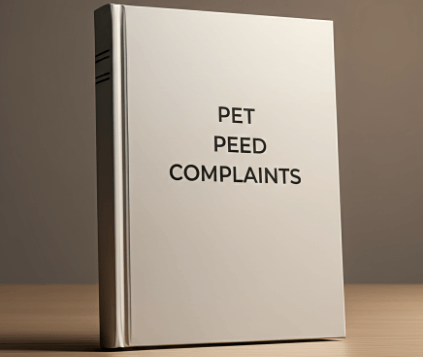If you’re a pet owner, property manager, or apartment dweller in Florida, you might have encountered “pet peed complaints.” These complaints can be a significant source of tension and frustration for all parties involved. This article dives deep into pet peed complaints, why they happen, and how to handle them effectively for a harmonious living environment.
Real estate investors Steve Daria and Joleigh have encountered numerous tenant issues, with pet peed complaints among Florida’s most common complaints. Addressing such concerns is crucial to maintaining property value and ensuring tenant satisfaction.
What are Pet Peed Complaints?
Pet peed complaints refer to grievances lodged by tenants, neighbors, or property managers concerning the behavior or impact of pets in rental properties.
These complaints are often related to noise, damage, cleanliness, and overall pet management within the property.

Common Types of Pet Peed Complaints
Noise
- Example: Tenants complain about dogs barking incessantly.
Damage
- Example: Cats scratching walls or dogs chewing on furniture.
Cleanliness
- Example: Pet waste needs to be appropriately disposed of in common areas.
Odor
- Example: Strong pet odors permeating through walls and floors.
Allergies
- Example: Neighbors experiencing allergic reactions due to pet dander.
Get An Offer Today, Sell In A Matter Of Days
Why Do Pet Peed Complaints Occur?
Understanding the root causes of these complaints can help address and prevent them.
Here are some common reasons:
Lack of Training
Pets that are not adequately trained can exhibit destructive behavior, leading to damage and noise complaints.
Proper training from a young age can mitigate these issues.
Insufficient Exercise
Pets that need to receive adequate exercise may become restless and noisy.
Regular walks and playtime can help keep pets calm and content.
Poor Hygiene Practices
Improper cleaning of pet areas can lead to odors and cleanliness complaints.
Regular grooming and cleaning routines are essential.
Inadequate Supervision
Leaving pets unsupervised for long periods can result in undesirable behavior.
Ensuring pets are well-supervised or have a companion can reduce such issues.
Strategies to Handle Pet Peed Complaints
Addressing these complaints effectively requires a proactive approach.
Here are some strategies for pet owners, property managers, and tenants:
For Pet Owners
- Train Your Pet: Investing in professional training, if needed, can help address behavioral issues and ensure your pet is well-behaved in a rental environment.
- Exercise Regularly: Daily exercise for your pet is essential for their physical and mental state, minimizing the chance of engaging in destructive behaviors stemming from boredom or excess energy.
- Maintain Hygiene: Regularly cleaning pet areas and disposing of waste properly is important for maintaining a clean and sanitary living environment for you and your neighbors.
- Supervise Your Pet: Avoiding leaving your pet alone for extended periods can help prevent boredom-related behaviors such as excessive barking or chewing.
For Property Managers
- Set Clear Guidelines: Establish pet policies and include them in the lease agreement to ensure all tenants know the rules regarding pets on the property.
- Conduct Regular Inspections: Performing routine property checks allows landlords to monitor pet policy compliance and promptly address any issues.
- Provide Amenities: Offering designated pet areas such as dog parks or pet waste stations promotes responsible pet ownership.
- Facilitate Communication: Encouraging open communication between tenants regarding pet concerns fosters a sense of community and facilitates the resolution of any potential disputes.
For Tenants
- Communicate: Tenants need to maintain open communication regarding pet-related concerns. By discussing these concerns politely with neighbors, tenants can often find amicable solutions to potential issues.
- Understand Pet Policies: Familiarizing oneself with the property’s pet policies is crucial for tenants living in pet-friendly communities. Knowing the rules and regulations regarding pets helps tenants abide by them and fosters a harmonious living environment for all residents.
- Practice Patience: Pets are integral to many communities and tenants must recognize and respect their presence. Patience and understanding can go a long way in resolving conflicts or disagreements related to pets.
Tips for Preventing Complaints
Preventing these complaints starts with responsible pet ownership and considerate neighbor interactions. Here are some tips to help:
Create a Pet-Friendly Environment
Designate specific areas for pets to play and relieve themselves.
Use pet-friendly cleaning products to manage odors and stains.

Establish Routine Check-Ins
Regularly check on your pet’s behavior and health.
Schedule routine vet visits to make sure your pet is healthy and well-behaved.
Engage with the Community
Participate in community events that involve pets.
Build positive relationships with neighbors and property managers.
Educate Yourself and Others
Stay informed about best practices for pet care and behavior.
Share knowledge with fellow pet owners to promote a harmonious living environment.
Frequently Asked Questions
This section addresses common queries regarding pet-related complaints for tenants in Florida.
What should I do if my neighbor’s pet is causing problems?
First, approach your neighbor politely and discuss the issue.
If the problem persists, report it to the property manager with specific examples and dates of the incidents.
How can I ensure my pet-friendly property remains clean and odor-free?
Implement regular cleaning routines, use pet-friendly cleaning products, and encourage tenants to maintain their pet areas.
Providing amenities like pet waste stations can also help.
Are there any legal protections for pet owners facing complaints?
Laws differ by location, and some places have pet-friendly housing laws.
Understanding local regulations and ensuring compliance with property-specific pet policies is essential.
Conclusion
Pet peed complaints are common in rental properties but can be managed efficiently with proactive measures and open communication. By understanding the causes and applying the strategies outlined in this article, pet owners, property managers, and tenants can create a harmonious living environment for everyone. Working together, we can ensure that pets and people enjoy a peaceful and happy living experience.
By embedding these strategies into your daily routines, you can reduce the likelihood of these complaints and foster a more inclusive, pet-friendly community. Remember, a little effort goes a long way in maintaining harmony between pet owners and their neighbors. Happy pet parenting!
**NOTICE: Please note that the content presented in this post is intended solely for informational and educational purposes. It should not be construed as legal or financial advice or relied upon as a replacement for consultation with a qualified attorney or CPA. For specific guidance on legal or financial matters, readers are encouraged to seek professional assistance from an attorney, CPA, or other appropriate professional regarding the subject matter.

